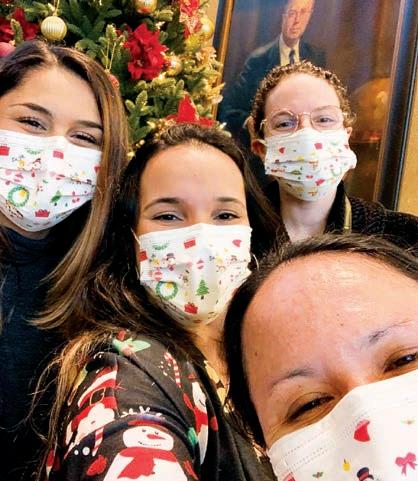
8 minute read
AROUND THE INSTITUTE: REFLECTIONS ON 2020
The Texas Biomed team did an incredible job keeping the Institute and its critical research mission running smoothly and safely despite immense challenges presented by the pandemic. We asked team members from across the Institute to share their experiences, challenges and successes from 2020.
Working from home on a laptop, rather than two monitors, took some adjusting. My other challenge was when I would have to come to the office to print and file protocols and had to wear shoes. This sounds silly, but when working from home, I didn’t wear shoes. I am thankful for my family remaining healthy during this pandemic. — Johnny Saucedo, LVT, RLATG, Institutional Animal Care and Use Committee (IACUC) Coordinator
It was business as usual for the Shipping and Receiving crew. We knew that we still needed to get the product to the labs so that they could help find a vaccine. With everyone around the world looking for the same kind of PPE, we were getting slammed with more than the usual amount of orders for PPE and other material that the labs and the other folks on campus needed. Wearing a mask for over a year was a little tough, but I was proud that we stayed COVID-19 free by following the Texas Biomed rules, since we are pretty much all over campus delivering product. — Daniel Salinas, Shipping and Receiving Lead Finance
Texas Biomed researchers Alyssa Schami, Angélica M. Olmo-Fontánez, Anna Allue and Paula Pino celebrate Christmas during the pandemic.
Working during the pandemic was a bizarre experience that I will never forget. I am so grateful I was able to make further progress on my science research, work on COVID-19 projects and two peer-reviewed manuscripts. As a microbiologist, and proud Latina mom, I took this pandemic very seriously and was eager to share my scientific knowledge with my family and community. Being able to successfully explain how a vaccine works to my 85-year-old grandma was a true blessing!
— Angélica M. Olmo-Fontánez, MS,
PhD candidate, UTHSCSA Population Health & Host Pathogen Interactions Programs
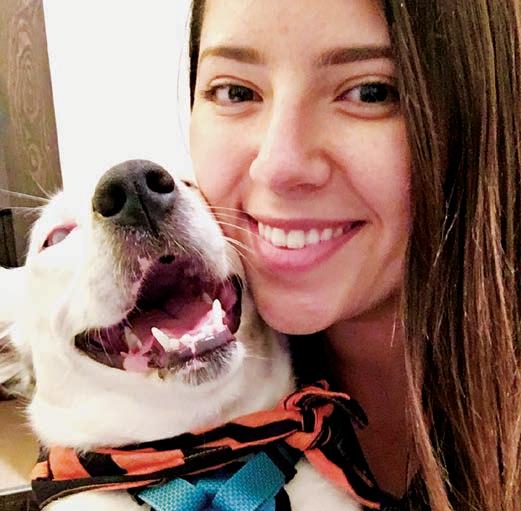
During the pandemic, Price used her spare time to transport, foster and adopt out around 30 dogs.
My hard-working team went above and beyond to maintain our baboon colony, which necessitated long work hours (nights, weekends, holidays), extra PPE, figuring out how to socially distance while performing tasks that normally require us to be in close proximity, and a willingness to show up despite the fear and uncertainty surrounding each new day. I am proud to have been a part of science in real time. Many of my baboons were chosen for the COVID-19 vaccine study, and were instrumental in its development. Even though it is extremely difficult on the care staff when animals are placed on terminal studies, it helps to know that they were key in pioneering new discoveries. — Ashley Price, Animal Caretaker IV, Colony Team Lead Southwest National Primate Research Center
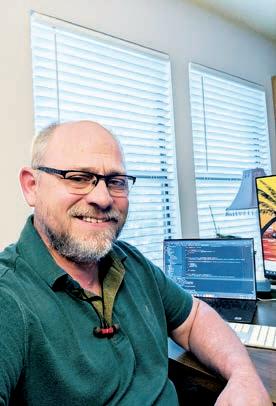
While his home office was productive, Hawkins is looking forward to having fewer online meetings and getting back to brainstorming ideas with his team in person. Like many at Texas Biomed, I was part of the remote workforce during the pandemic. It took a couple of weeks to really get into the swing of working from home, but after that, I found that most tasks could be accomplished at home without much change. The IT department did an incredible job of getting people moved off-campus in such a short time, and we were able to give our users the same level of support regardless of whether they were on or off-campus. The most significant change for me was sharing an office for the first time in 25 years. My wife was a great office mate, but we had to coordinate our schedules to avoid interfering with each other’s Zoom meetings. — Terry Hawkins, Director Software Development/IT
As an essential worker, I came into the office, which provided consistency during this very uncertain time. Early on, my leadership split the team into cohorts to minimize the quarantine time and missed days due to exposure, even with so many people still being “in office” to care for the animals and continue the important research work we do here. The most challenging thing about 2020 was not being able to see my two sisters, 95-year-old grandmother and closest friends. But on the positive side: I started my career at Texas Biomed in the baboon clinic, installed an in-ground pool in my home, maintained good mental health, and even created life-long friendships. — Aurora Shingledecker, Veterinary Technician Southwest National Primate Research Center
REFLECTIONS

Scudder traded his work office with an over-zealous AC for a renovated shed.
The biggest hurdle was trying to fit in the increased volume of work that needed to be done, while also trying to ensure my daughter focused on virtual school rather than Minecraft. Our department has had a two-fold increase in proposal submissions and a three-fold increase in account setups and monitoring over the past year. (Shout out to Jen Gaitan, Juan Esquivel, Eduardo Meza, Mary Riedel and Ruth Arauz!) When all is said and done, I take solace in the fact that we in Sponsored Programs and Texas Biomed are doing our parts to bring COVID-19 to an end. I am extremely proud to be a small part of that.
— Jonathan D. Scudder, MS, MBA,
Manager Sponsored Programs Administration Fortunately, I was able to transition to working from home without changing my work responsibilities. I relied heavily on the essential SNPRC staff managing animals and research on-site and give a lot of credit to my other team members who transitioned to working from home. Like many parents, my biggest challenge was juggling work, managing a home daycare, and running a home school. The rapidly developed mRNA vaccines will undoubtedly be regarded as one of the biggest medical achievements of our lifetimes. I’m proud that our Institution played an important role in its development and helped save countless lives. — Christopher Chen, Staff Scientist III, Assistant Director for Research Support Southwest National Primate Research Center
While juggling work and childcare was a challenge, there were also more opportunities for family play time.
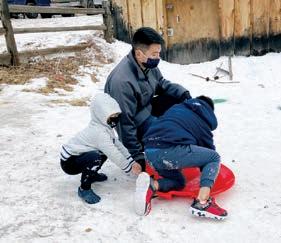
I am so thankful to Texas Biomed, our insanely talented essential workers and all our administrative staff for pulling together to keep the Institute safe, operating and productive! The senior leadership team ushered the majority of administrative staff safely offsite during the onset of the pandemic, while limiting the exposure for critical workers onsite. My proudest work accomplishment was being able to create, build and implement a new performance management (EPM) platform during the pandemic with my work team. We worked very long hours to deliver a robust and functioning EPM prior to our 2020 performance launch.
— Savannah Wylie,
Benefits and Compensation Specialist Human Resources
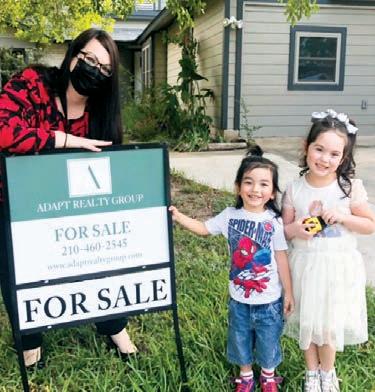
Wylie and her little “covid bubble” took advantage of low interest rates and bought their first home during the pandemic. They have spent their time off turning their house into a home.
The biggest challenge was balancing work and home life with the uncertainty of the virus. I didn’t want to expose my family but still needed to work on campus. Fortunately, we all saw the COVID work at Texas Biomed with an amazing scientific research team, which infused layers of confidence that we would find a cure for this infectious disease. Still, we all dealt with forms of COVID-Fatigue and for me on a personal note, I lost my Mom (unrelated to COVID very suddenly in July 2020) and with rising COVID cases across the country was not able to travel to see my Dad. Now, we are all fully vaccinated and able to be together. We are so grateful to those amazing scientific research teams who tested vaccine efficacy. — Mark A. Hammargren, CPP®, Director Security & Emergency Preparedness
We’re lucky because a lot of service people lost their jobs during this time. We were blessed to have a job that definitely kept going because our institute was doing research on COVID-19. I’m proud that we were able to get everything done with skeleton crews and everybody was willing to do what needed to be done — work weekends, work holidays — to make sure the mechanical systems and HVAC systems were running, especially for the biocontainment labs and animal areas. I’m glad that we helped everybody to keep moving with their science.
— Briana Mendez,
HVAC & Mechanical Systems Supervisor Biocontainment Maintenance w ww
Briana Mendez took on a supervisory role at the beginning of 2020, embracing the challenge of learning on-the-go during the pandemic. I successfully completed a tuberculosis (TB) and simian immunodeficiency virus (SIV) co-infection study on rhesus macaques and participated in the COVID-19 studies on non-human primates. It was challenging for me as a mother and scientist to balance taking care of my 6-yearold daughter, especially with her virtual schooling, and perform high risk research with both COVID and TB/SIV in BSL-3. Despite the pandemic, I was extremely productive during 2020. My biggest achievement in 2020 was being awarded the prestigious Early Career Investigator - K01 Mentored Career Development Award for 2021-2024 by the NIH to conduct independent research in the field of TB/SIV co-infection. — Riti Sharan, PhD, Staff Scientist I Host-Pathogen Interactions Program
Dr. Sharan, masked up and having fun with her family at Disney World.
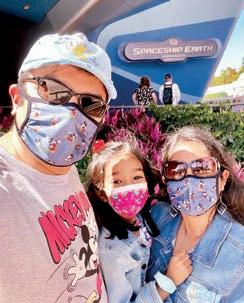
It was a world that I could never have imagined, where every other day I was hearing that many friends, neighbors or social acquaintances sadly lost their friends or family members. It was particularly challenging to maintain the mental strength to work in those situations on the same virus. I was primarily involved in external contracts focused on developing vaccine and therapeutic targets against COVID-19. We tested various vaccines and drug-molecules for anti-SARS-CoV-2 efficacy in in vitro and in vivo models, so they could be taken to the next stage of development. It feels great that in this tough time, we were able to make a direct and positive impact on people’s lives. — Varun Dwivedi, PhD, Staff Scientist I Disease Intervention & Prevention Program








